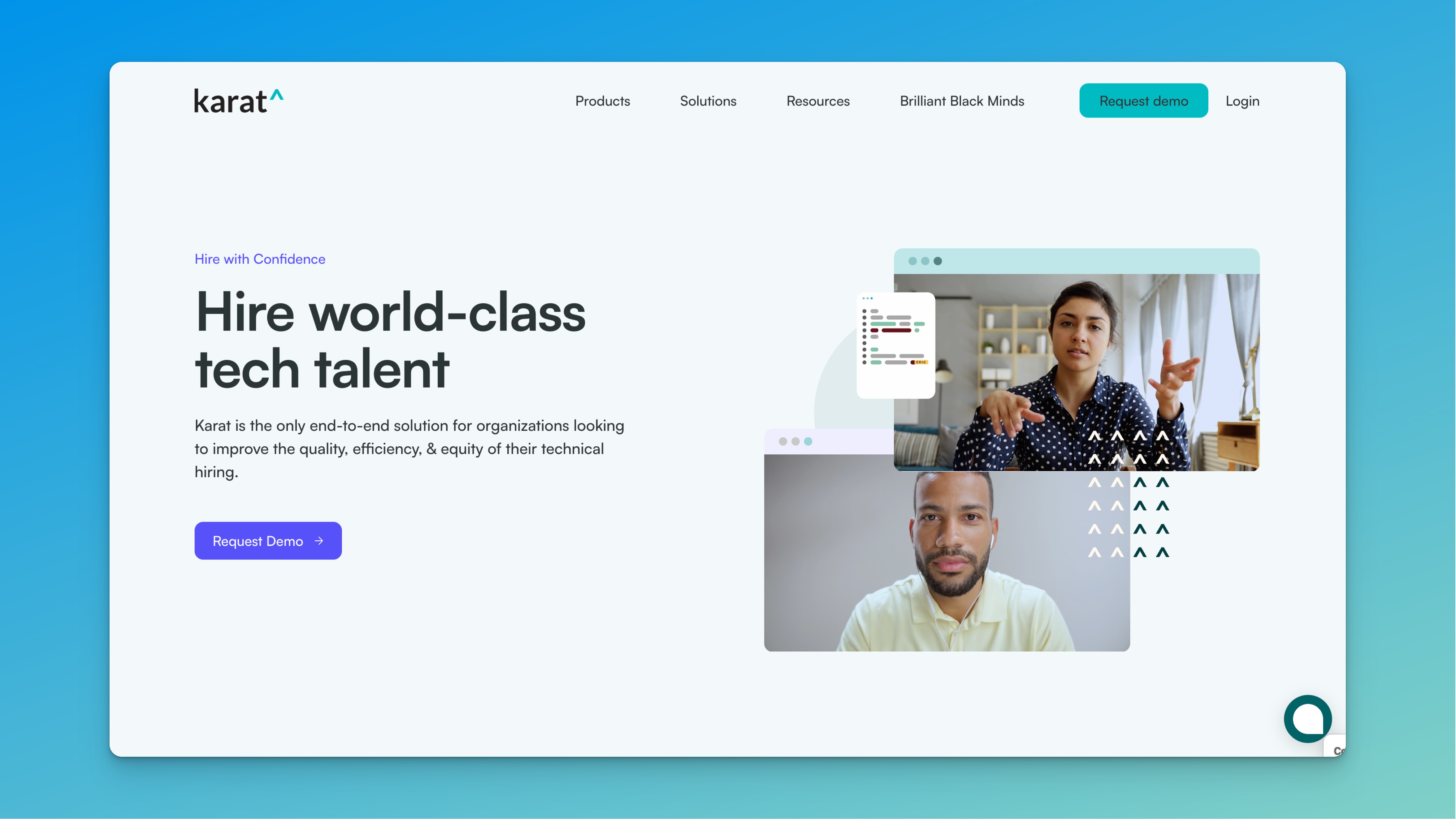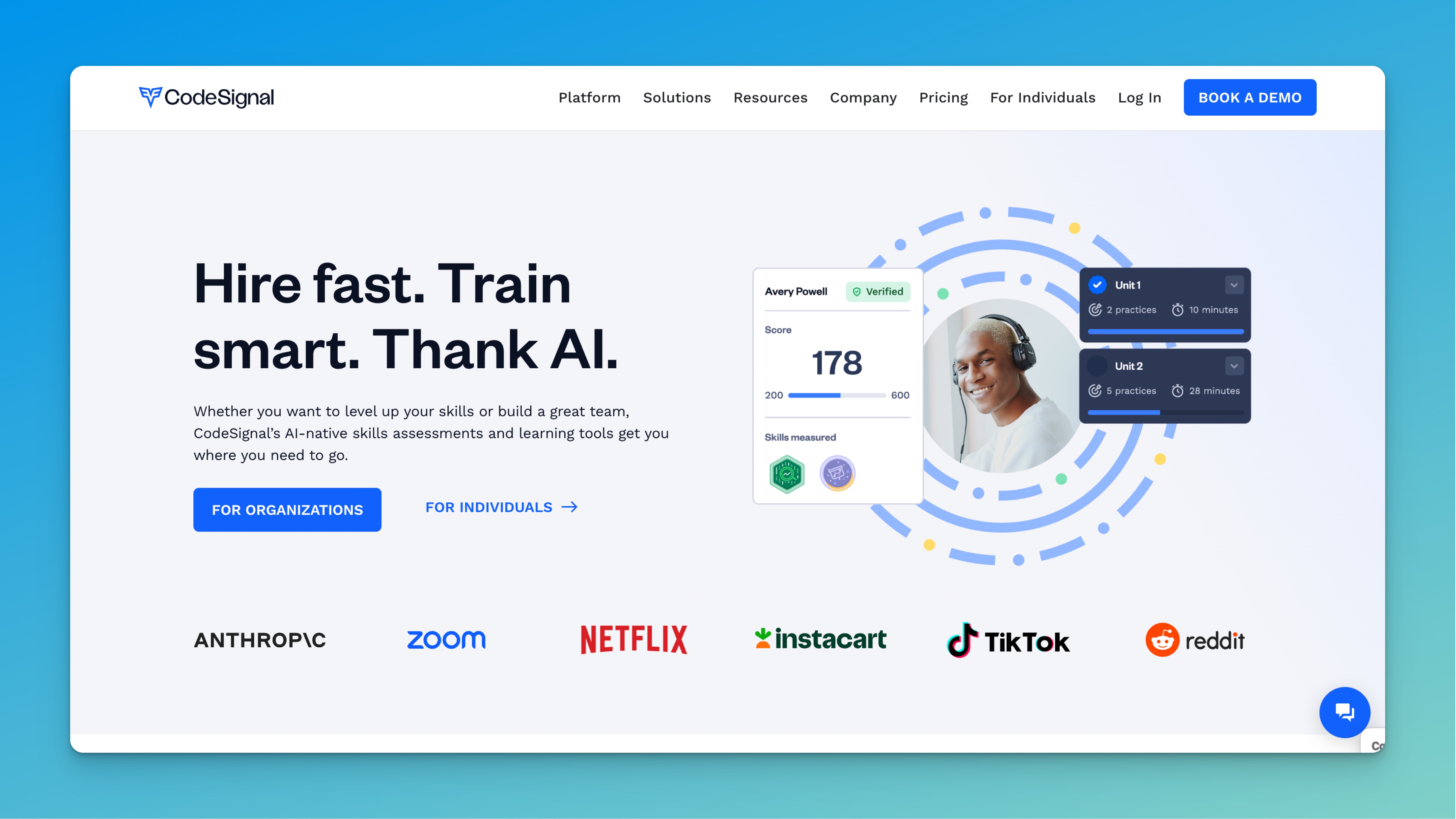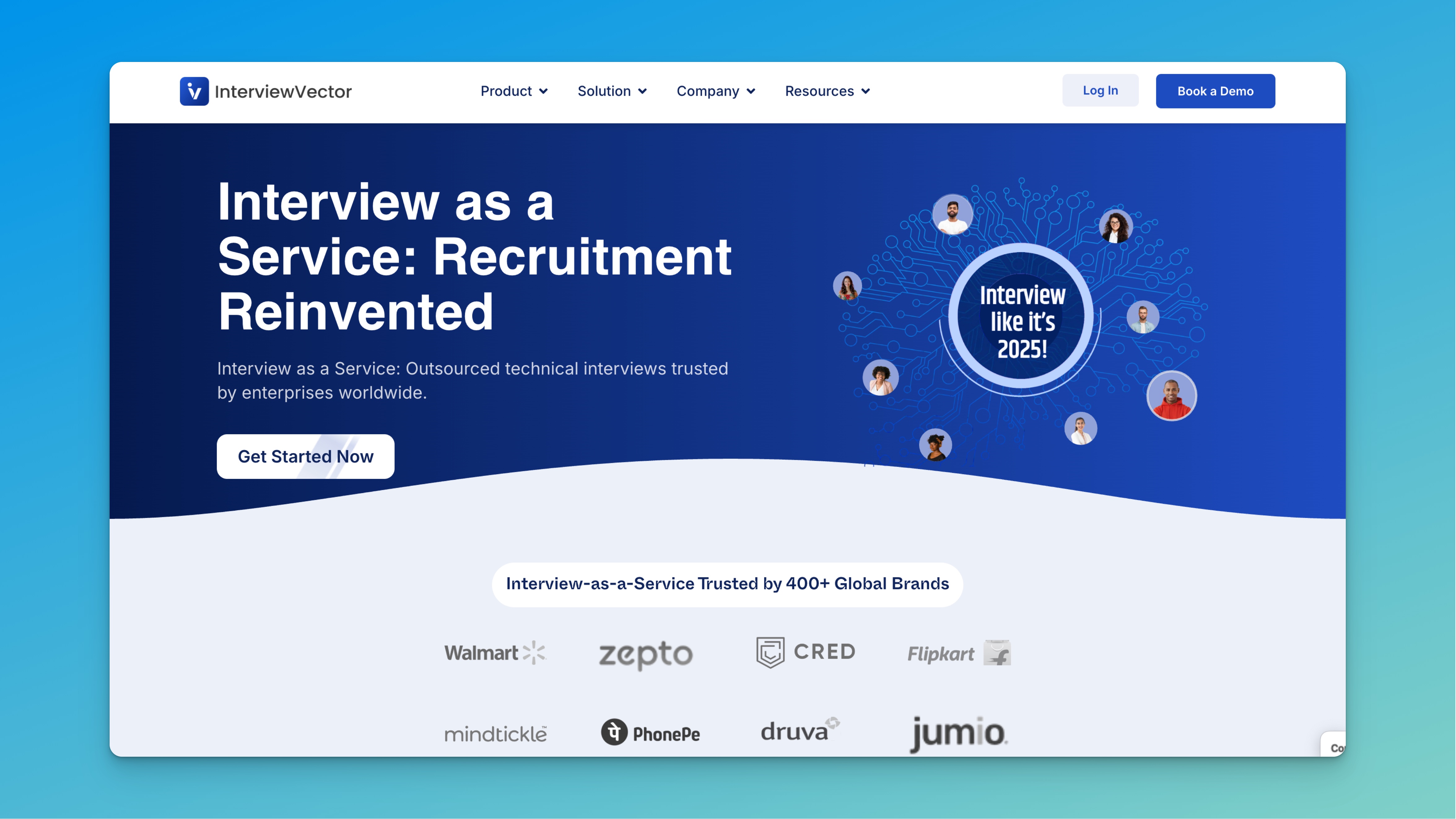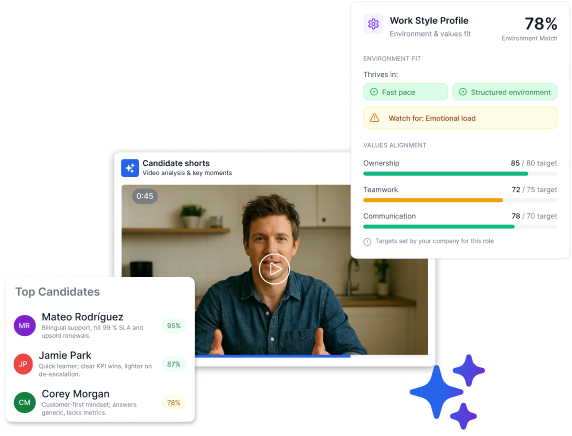Hiring in 2026 isn’t slow because there’s a talent shortage. It’s slow because there’s too much noise.
Thanks to AI-generated resumes, one-click apply tools, and macroeconomic uncertainty, recruiters are drowning in inbound. For every qualified candidate, there are dozens of mismatches clogging your ATS, eating up hiring manager time, and making every open role feel harder than it should be.
Interview as a Service (IaaS) offers a way out. By outsourcing structured interviews to trained professionals—engineers, sales leaders, and domain experts—you can screen candidates faster and more consistently, without overloading your team.
This article breaks down the top IaaS providers in 2026, how they differ from AI-assisted screening platforms, and when to use each approach to build a faster, more structured, and more scalable hiring process.
Disclosure: Truffle is mentioned in this article as one example of an AI-assisted screening platform alternative to Interview as a Service.
What is an Interview as a Service (IaaS) provider?
Interview as a Service is a scalable solution to run expert-led interviews without draining your internal team. IaaS providers offer outsourced interviewers—typically trained subject-matter experts—who conduct structured interviews on your behalf. These aren’t generic recruiters or AI bots. They’re real engineers, sales leaders, or role-specific professionals who follow your rubrics, ask smart follow-ups, and deliver structured, calibrated feedback.
1. Karat
Best for engineering hiring at scale

Overview:
Karat is the OG in the IaaS space, specializing in technical interviews for software engineers. Their global network of vetted engineers conducts structured, live coding interviews across roles from front-end to DevOps to data science.
What sets them apart:
• 24/7 interview availability
• Live interviews with human engineers (not bots)
• Calibrated question bank tailored to role level and domain
• High-quality feedback within 24–48 hours
• Data-backed insights for continuous improvement
Ideal for:
Tech companies doing high-volume hiring, or any org with inconsistent engineering interview quality. Karat is especially useful when hiring across time zones or running large hiring events (e.g., bootcamp pipelines, university recruiting).
2. interviewing.io
Best for anonymous engineering screening

Overview:
interviewing.io pioneered the concept of blind technical interviews. Candidates and interviewers meet in a collaborative coding environment with no names or resumes.
What sets them apart:
• Anonymous interviews to reduce bias
• Recordings and transcripts for internal review
• Real-time feedback from senior engineers
• Flexible API and ATS integrations
• Marketplace of pre-vetted candidates available
Ideal for:
Companies with DEI mandates, startups that want to do blind hiring, or teams that value performance over pedigree. Also great for sourcing hard-to-find backend and infrastructure talent.
3. CodeSignal IaaS
Best for quantifying early-stage engineering talent

Overview:
While CodeSignal is best known for its candidate assessment software, its IaaS model includes trained interviewers conducting live technical interviews using their platform. These sessions often follow an initial General Coding Assessment.
What sets them apart:
• Custom interview templates by role
• Real-time collaboration and scoring
• Interview replay features
• Detailed scoring rubrics
• Aligned with engineering hiring frameworks (like Google’s)
Ideal for:
Early- to mid-stage tech companies looking to operationalize their tech screen process. Particularly helpful for high-volume hiring in SWE, SDET, and data roles.
4. BarRaiser
Best for structured interviews and detailed scorecards

Overview:
BarRaiser uses a bank of expert interviewers and structured evaluation rubrics to ensure interview consistency and reduce subjective scoring. Their platform includes an “interview copilot” that suggests follow-ups in real time.
What sets them apart:
• Interview intelligence layer for consistency
• Detailed and standardized scorecards
• Easy scheduling and ATS sync
• Strong documentation for audit trails
• Option to plug in your own panelists for calibration
Ideal for:
Companies building a scalable, auditable hiring process. Especially useful for reducing hiring bias and interviewer training burden across large orgs.
5. InterviewVector
Best for cost-effective technical interviews in APAC

Overview:
Popular among Indian and Southeast Asian tech companies, InterviewVector provides affordable, scalable interview services. Their panelists span full-stack, mobile, QA, and data science roles.
What sets them apart:
• Cost-effective pricing for scale
• Regional timezone support
• Quick turnaround (24h)
• Detailed performance reports
• Flexible bulk interview packages
Ideal for:
Startups hiring in India or SEA, or global companies building regional teams. Particularly strong for local graduate and junior developer pipelines.
When to use IaaS (and when not to)
Here's when we typically see companies turn to IaaS providers and when it doesn't make sense.
Use IaaS when:
• Your internal team is at capacity and slowing down hiring
• You’re running high-volume, repeatable roles
• You need to reduce bias or improve consistency
• You want to pilot structured interviewing before building it internally
• You’re hiring in markets where your team lacks language or domain expertise
Avoid IaaS when:
• Culture fit or team dynamics are a critical part of the role
• You’re hiring your first key leadership position
• You need to sell the candidate on your team’s mission and vision (IaaS can’t replace founder sell-in)
What to look for in an IaaS partner
Not all IaaS providers are created equal. Before choosing, consider:
• Interview calibration: Can their panelists match your bar?
• Turnaround time: Can they return scores fast enough for your pipeline speed?
• Candidate experience: Will your brand be represented well?
• Customization: Can they adapt to your role and values and not just generic competency models?
• Data and insights: Do you get useful performance analytics beyond a pass/fail?
The best IaaS platforms don’t just run interviews. They give you leverage by turning every interviewer into an extension of your hiring bar, not a wildcard in your process.
AI-assisted screening platforms vs. Interview as a Service
Not every company needs a live interviewer in every loop. In fact, one of the biggest decisions in designing your hiring process is choosing between AI-assisted screening platforms and human-led interviews via IaaS. Both serve as scalable solutions to top-of-funnel screening, but they solve different problems.
AI-assisted screening platforms
AI-assisted candidate screening platforms like Truffle, Hireflix, and Willo allow candidates to record responses to pre-set questions on their own time. Platforms like Truffle combine async video with AI-assisted review—surfacing summaries, match scores, and short highlight clips—plus AI-resistant assessments that measure personality tendencies, situational judgment, and environment fit. This helps teams screen every applicant without phone-screening all of them.
Pros:
• Screen every applicant without phone-screening all of them
• Consistent questions across all candidates
• No scheduling overhead
• Reviewable and shareable by multiple stakeholders
• AI-assisted review surfaces summaries and match scores to prioritize who's worth talking to
• Cost-effective for high-volume roles
Cons:
• No follow-up questions or clarifications
• Risk of robotic or over-rehearsed answers
• Candidate drop-off can be higher if not positioned well
• Less suitable for deep technical or strategic roles
Best for:
Front-line roles, retail, customer support, internships, or any hiring process that needs to surface communication skills, professionalism, or environment fit—not technical depth. Particularly effective when combined with assessments that measure what AI can't fake: personality tendencies, situational approach, and work environment preferences.
The business impact of getting interviews right
When hiring stalls, everything else does too: shipping velocity, customer satisfaction, revenue. Interview as a Service doesn’t just fix a broken process. It helps teams move faster with more confidence and more consistency.
As AI transforms sourcing, assessment, and even onboarding, IaaS platforms will likely evolve into orchestration layers that combine AI agents with human interviewers. But the premise will remain: great hiring starts with great interviews. And those are too important to leave to chance.
The TL;DR
Hiring in 2026 isn’t slow because there’s a talent shortage. It’s slow because there’s too much noise.
Thanks to AI-generated resumes, one-click apply tools, and macroeconomic uncertainty, recruiters are drowning in inbound. For every qualified candidate, there are dozens of mismatches clogging your ATS, eating up hiring manager time, and making every open role feel harder than it should be.
Interview as a Service (IaaS) offers a way out. By outsourcing structured interviews to trained professionals—engineers, sales leaders, and domain experts—you can screen candidates faster and more consistently, without overloading your team.
This article breaks down the top IaaS providers in 2026, how they differ from AI-assisted screening platforms, and when to use each approach to build a faster, more structured, and more scalable hiring process.
Disclosure: Truffle is mentioned in this article as one example of an AI-assisted screening platform alternative to Interview as a Service.
What is an Interview as a Service (IaaS) provider?
Interview as a Service is a scalable solution to run expert-led interviews without draining your internal team. IaaS providers offer outsourced interviewers—typically trained subject-matter experts—who conduct structured interviews on your behalf. These aren’t generic recruiters or AI bots. They’re real engineers, sales leaders, or role-specific professionals who follow your rubrics, ask smart follow-ups, and deliver structured, calibrated feedback.
1. Karat
Best for engineering hiring at scale

Overview:
Karat is the OG in the IaaS space, specializing in technical interviews for software engineers. Their global network of vetted engineers conducts structured, live coding interviews across roles from front-end to DevOps to data science.
What sets them apart:
• 24/7 interview availability
• Live interviews with human engineers (not bots)
• Calibrated question bank tailored to role level and domain
• High-quality feedback within 24–48 hours
• Data-backed insights for continuous improvement
Ideal for:
Tech companies doing high-volume hiring, or any org with inconsistent engineering interview quality. Karat is especially useful when hiring across time zones or running large hiring events (e.g., bootcamp pipelines, university recruiting).
2. interviewing.io
Best for anonymous engineering screening

Overview:
interviewing.io pioneered the concept of blind technical interviews. Candidates and interviewers meet in a collaborative coding environment with no names or resumes.
What sets them apart:
• Anonymous interviews to reduce bias
• Recordings and transcripts for internal review
• Real-time feedback from senior engineers
• Flexible API and ATS integrations
• Marketplace of pre-vetted candidates available
Ideal for:
Companies with DEI mandates, startups that want to do blind hiring, or teams that value performance over pedigree. Also great for sourcing hard-to-find backend and infrastructure talent.
3. CodeSignal IaaS
Best for quantifying early-stage engineering talent

Overview:
While CodeSignal is best known for its candidate assessment software, its IaaS model includes trained interviewers conducting live technical interviews using their platform. These sessions often follow an initial General Coding Assessment.
What sets them apart:
• Custom interview templates by role
• Real-time collaboration and scoring
• Interview replay features
• Detailed scoring rubrics
• Aligned with engineering hiring frameworks (like Google’s)
Ideal for:
Early- to mid-stage tech companies looking to operationalize their tech screen process. Particularly helpful for high-volume hiring in SWE, SDET, and data roles.
4. BarRaiser
Best for structured interviews and detailed scorecards

Overview:
BarRaiser uses a bank of expert interviewers and structured evaluation rubrics to ensure interview consistency and reduce subjective scoring. Their platform includes an “interview copilot” that suggests follow-ups in real time.
What sets them apart:
• Interview intelligence layer for consistency
• Detailed and standardized scorecards
• Easy scheduling and ATS sync
• Strong documentation for audit trails
• Option to plug in your own panelists for calibration
Ideal for:
Companies building a scalable, auditable hiring process. Especially useful for reducing hiring bias and interviewer training burden across large orgs.
5. InterviewVector
Best for cost-effective technical interviews in APAC

Overview:
Popular among Indian and Southeast Asian tech companies, InterviewVector provides affordable, scalable interview services. Their panelists span full-stack, mobile, QA, and data science roles.
What sets them apart:
• Cost-effective pricing for scale
• Regional timezone support
• Quick turnaround (24h)
• Detailed performance reports
• Flexible bulk interview packages
Ideal for:
Startups hiring in India or SEA, or global companies building regional teams. Particularly strong for local graduate and junior developer pipelines.
When to use IaaS (and when not to)
Here's when we typically see companies turn to IaaS providers and when it doesn't make sense.
Use IaaS when:
• Your internal team is at capacity and slowing down hiring
• You’re running high-volume, repeatable roles
• You need to reduce bias or improve consistency
• You want to pilot structured interviewing before building it internally
• You’re hiring in markets where your team lacks language or domain expertise
Avoid IaaS when:
• Culture fit or team dynamics are a critical part of the role
• You’re hiring your first key leadership position
• You need to sell the candidate on your team’s mission and vision (IaaS can’t replace founder sell-in)
What to look for in an IaaS partner
Not all IaaS providers are created equal. Before choosing, consider:
• Interview calibration: Can their panelists match your bar?
• Turnaround time: Can they return scores fast enough for your pipeline speed?
• Candidate experience: Will your brand be represented well?
• Customization: Can they adapt to your role and values and not just generic competency models?
• Data and insights: Do you get useful performance analytics beyond a pass/fail?
The best IaaS platforms don’t just run interviews. They give you leverage by turning every interviewer into an extension of your hiring bar, not a wildcard in your process.
AI-assisted screening platforms vs. Interview as a Service
Not every company needs a live interviewer in every loop. In fact, one of the biggest decisions in designing your hiring process is choosing between AI-assisted screening platforms and human-led interviews via IaaS. Both serve as scalable solutions to top-of-funnel screening, but they solve different problems.
AI-assisted screening platforms
AI-assisted candidate screening platforms like Truffle, Hireflix, and Willo allow candidates to record responses to pre-set questions on their own time. Platforms like Truffle combine async video with AI-assisted review—surfacing summaries, match scores, and short highlight clips—plus AI-resistant assessments that measure personality tendencies, situational judgment, and environment fit. This helps teams screen every applicant without phone-screening all of them.
Pros:
• Screen every applicant without phone-screening all of them
• Consistent questions across all candidates
• No scheduling overhead
• Reviewable and shareable by multiple stakeholders
• AI-assisted review surfaces summaries and match scores to prioritize who's worth talking to
• Cost-effective for high-volume roles
Cons:
• No follow-up questions or clarifications
• Risk of robotic or over-rehearsed answers
• Candidate drop-off can be higher if not positioned well
• Less suitable for deep technical or strategic roles
Best for:
Front-line roles, retail, customer support, internships, or any hiring process that needs to surface communication skills, professionalism, or environment fit—not technical depth. Particularly effective when combined with assessments that measure what AI can't fake: personality tendencies, situational approach, and work environment preferences.
The business impact of getting interviews right
When hiring stalls, everything else does too: shipping velocity, customer satisfaction, revenue. Interview as a Service doesn’t just fix a broken process. It helps teams move faster with more confidence and more consistency.
As AI transforms sourcing, assessment, and even onboarding, IaaS platforms will likely evolve into orchestration layers that combine AI agents with human interviewers. But the premise will remain: great hiring starts with great interviews. And those are too important to leave to chance.
Try Truffle instead.









